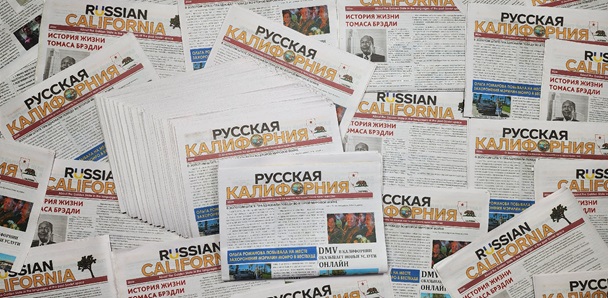The Importance of the Russian Language in California

Before California became the 31st state of the United States in 1850, it was a remarkable mosaic of cultures and languages. One striking aspect of this history is the notable presence of the Russian language, which was, in certain areas, spoken more frequently than English in the early 19th century. Understanding the historical and contemporary significance of the Russian language in California sheds light on the cultural dynamics of the region and the reasons behind the substantial Russian-speaking population today.
RUSSIAN CALIFORNIA — The interest of the Russian Empire in North America began during the time of Russian Alaska. In 1812, Russian explorers established Fort Ross on the northern coast of California, near Bodega Bay.
This settlement served as a base for the Russian-American Company, primarily engaged in the lucrative fur trade, especially considering the abundance of sea otters in the region.
With the arrival of more Russian settlers aiming to establish trade connections and secure a foothold in the land, Russian quickly became the common language within the community. At its peak, Fort Ross was inhabited not only by Russians, but also by a diverse group of Indigenous peoples and individuals from other cultures, including Spanish settlers.
During this era, the Russian language was actively used among settlers and often employed in trade dealings with local Indigenous tribes.
The Russian presence was so significant that, in some areas of California, Russian was more commonly spoken than English. The daily life dynamics within these Russian settlements were filled with cultural exchange, as Russians interacted with local tribes, established trade relationships, and sometimes intermarried, further integrating the Russian language into the local culture.
Documents from that time, including trade contracts and correspondence, indicate that the Russian language was frequently employed in both informal and formal contexts. However, with the rise of English-speaking settlers, particularly during the Gold Rush in the mid-19th century, the linguistic landscape began to shift.
As the influx of English-speaking immigrants increased, the English language gradually became dominant. However, the legacy of the Russian language and culture continued to exert influence, particularly in areas where Russian settlements had deep roots.
Currently, a significant number of Russian speakers reside mainly in the San Francisco Bay Area, Greater Sacramento, and southern regions around Los Angeles and San Diego.
Many Russian speakers may have no direct ties to modern Russia, but they hold a deep respect for the culture of their ancestors, which contributed to California’s rich cultural tapestry. Today, the historical presence of the Russian language in California stands as a testament to the state’s diverse cultural heritage.
While English now serves as the primary mode of communication in California, echoes of Russian influence can still be found in communities where descendants of the early Russian settlers maintain cultural and linguistic ties. Media, such as Russian California, celebrate and document Russian history in California, helping to preserve this unique heritage.
Russian-language newspapers and websites contribute to California’s communities, ensuring the preservation of the history of the Russian language and culture in the Golden State.
Prior to California’s admission to the United States, specific regions experienced a linguistic environment where Russian was more prevalent than English, especially in Russian settlements such as Fort Ross.
A notable place for studying the history of California and the Russian language is the Russian Center, located in San Francisco.
This center was established long before California became a U.S. state. The Russian Center serves as a vital resource for researchers, students, and anyone interested in Russian history in California. It houses archives, a library with books in Russian, and materials dedicated to the contributions of Russian immigrants to the development of the region.
The center also organizes various events, lectures, and exhibitions aimed at preserving cultural traditions and language for future generations. Visiting the Russian Center provides valuable insights into how Russian settlements have influenced California’s cultural diversity and the significance of their heritage in contemporary society.
Modern Russian-speaking residents of California actively build businesses in the state and contribute to the welfare of the local communities in various governmental agencies. Russian speakers are spread throughout the Golden State, and many do not hide their knowledge of the Russian language due to the unprovoked aggression of current Russian politicians against Ukraine.
It is essential to acknowledge that throughout the state of California, there are dozens of religious temples and churches that continue to inspire and enrich the lives of local residents. These religious centers often occupy buildings that can be considered architectural treasures of the Golden State, showcasing a variety of styles from historic to modern. Visitors and locals alike appreciate the beauty and cultural significance of these structures, which serve as places of worship, community gathering, and reflection.
In addition to their spiritual roles, many of these religious institutions also engage in community outreach programs, offering support and resources to those in need, thereby strengthening the bonds within the community. They often host events, festivals, and educational programs that celebrate diverse cultural traditions, making them vital hubs of activity.
While there are only a few fully Russian-speaking libraries in California, many libraries across various counties generally feature sections dedicated to Russian literature and other materials in the Russian language. These sections help serve the needs of the Russian-speaking community, allowing individuals to access books, magazines, and other resources that connect them to their heritage and culture. Moreover, these libraries often host cultural events, language classes, and book clubs, fostering a sense of community and encouraging the exchange of ideas among residents from various backgrounds.
Russian speakers work at numerous universities in California, educating children and passing on knowledge to contemporary generations.
For Russia, California plays a key role on the international stage, and for the Golden State, Russia can be a significant partner in various affairs — although this is a prospect that can only be envisioned after the conclusion of the war in Ukraine.
The war in Ukraine, which began in 2014, has led to significant changes in the relationship between Russia and California, reflecting broader geopolitical tensions. One of the most notable impacts has been the restriction of direct connections between the Golden State and Russia. In 2022, regular air travel between Moscow, the capital of Russia, and Los Angeles came to a halt. Flights that had once been operated daily were discontinued, affecting countless travelers from Western America and California residents with relatives across the post-Soviet space.
The loss of these direct flights has severely impacted the ability of many to maintain family connections and conduct business. Before the cessation of service, numerous Western travelers and locals frequently made the journey to Moscow for various reasons, including tourism, business ventures, and family visits. Some Russian airlines had even planned to establish direct flights from Moscow to San Francisco, envisaging a bustling route between the largest country in the world and the West Coast of the United States. However, these plans never materialized due to the ongoing conflict that has defined the international landscape.
San Francisco is home to a significant population of Russian-speaking individuals who have contributed immensely to California’s development. Among the notable figures from this community is Sergey Brin, an internet entrepreneur born on August 21, 1973, in Moscow.
Brin co-founded Google alongside Larry Page and served as the president of Alphabet Inc., the parent company of Google. His success story exemplifies the positive impact that the Russian-speaking community has had on the innovation and economy of California.
The limitations in California-Russia relations are a direct result of the war waged by Vladimir Putin’s government against the Ukrainian people. The local Russian-speaking community, while navigating the challenges posed by the geopolitical situation, continues to strive for cultural exchange and understanding. However, any hopes for the resumption of air travel and the strengthening of ties between California and Russia are contingent on the resolution of the conflict in Ukraine.
In conclusion, the ongoing war has not only altered economic and social dynamics but also strained personal connections between individuals in California and Russia. The path to rebuilding these relationships may only become clear once the violence ceases, allowing for new opportunities and collaborations to emerge on both sides. Until then, the Russian-speaking community in California remains hopeful for a future where ties can be restored and strengthened.
In California, Russian-speaking residents often live in harmony and peace with their Ukrainian neighbors. Many Russian speakers actively support Ukrainians who have fled the war and come to California.
An example is the story of Ksenia Khavana (Karelina), a woman from Russia who immigrated to the U.S. ten years ago and has spent recent years supporting Ukrainians and participating in protests in Los Angeles.
She faced repercussions when she returned to Russia to visit her relatives due to her outspoken support for Ukrainians. Now, Ksenia is in a Russian prison for 12 years.
According to research conducted by the Russian Academy of Sciences in 2005, the Russian language is understood by an impressive 400 to 500 million people worldwide. This vast number highlights the significance of Russian as a means of communication not only in Russia but also across many countries, particularly in Eastern Europe and the former Soviet Union.
Understanding or speaking Russian, or even any Slavic language, can enable individuals to connect with a substantial population, fostering cultural exchanges and social interactions.
In the United States, the presence of Russian speakers is also significant. An article published in the California-based publication Slavic Sacramento cites statements from the United States Census Bureau, indicating that approximately 5 million residents in the country speak languages from the former Soviet Union. This statistic reflects the rich linguistic diversity within the U.S., showcasing communities that contribute to the country’s multicultural landscape.
However, it is essential to consider that this number might be underestimated. Not all residents participate in surveys, and many individuals may not report their language skills. Additionally, the data might not account for the hundreds of thousands of people who have relocated to California and other parts of the U.S. in recent years, especially those fleeing the ongoing war in Ukraine. The influx of these individuals has likely increased the number of Russian speakers in California significantly, enriching the state’s cultural diversity.
Vitaly Ataev Troshin
